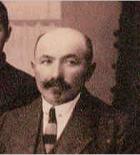THE JEW PRIVILEGES OF THE CITIES FLATOW AND KROJANKE
Privilege for the Jewish Community of Krojanke of July 1712
Jacob of Koscieler and Dzialyn = Dzialynski, the Lord and heir of Pakosch and Krojanke, > Woide of Kalisch.
I hereby make it known through this document to everybody, particularly those who are involved,, that I have given permission for Jews in my city of Krojanke in the Woiwodeship of Kalisch , in the "Bezirk" Nakel in der Kraina to buy as much land as needed for building their houses, but no Jew may build nor live on the streets at the market place except for those who are already their houses, in the market place and live there;
Tobias Kal???? Kuerschner Mendel Jacob Nassen and Samuel Wolff. These houses are theirs for all times.
They rest may only buy and build in the back streets. In addition I have given them the right, which I am confirming here for their oldtestmental service school [synagogue] as large as needed and they may close a convenient location in Krojanke.
In case this "school" -God Forbid - should be destroyed by fire or enemies, they are allowed to rebuild it. In addition , they build a hospital for the sick and poor Jews of both sexes, also a house for the rabbi and another one for the cantor, a third one for
the teacher and a school so that the Jewish children can be taught according to their confession also a bath house for Jewish women at their own expenses.
All these specified buildings as well as their location where they stand, and the people who live there shall be free from public and castle taxes. But on every Martinstag [Nov > 1st shall the Jews for all the other buildings pay me or my successors 200 Tymf/
They are freed from all services to the Lord of the Castle. They are permitted to find a proper location for the internment of their fellow believers. For the fence they may at their own expense transport lumber from the nearest woods. Their cemetery with the
building that belongs to it [of the gravedigger] shall be freed from all duties and taxes. They are allowed to carry their dead there when and where they wish on weekdays as well as holidays. Such burials shall take place undisturbed, without any interference.
but should they be disturbed the present of future "Statthalter" who lives in the castle shall severely punish the disturber.
On Easter - by order of the castle - the citizens shall stand guard so the Jews will be quiet during the procession. But if a Jew shall cause trouble, he shall be arrested and brought to the castle and the Statthalter shall punish him according to his offense. "
In regard to the legal system the Jews are under the jurisdiction of the castle and citizens shall not get involved with Jews in civil or criminal disputes. But when a Catholic or anyone else has demands against a Jew, he shall at first establish claims before the
Council of Jewish Elders, and if he does like like their decision an appeal to the Statthalter at the castle and from there the case may be brought before the Lord of the Castle.
In the case that a Jew serves a prison term he shall be brought to the Jewish prison for the full term. Whenever the bathhouse for the Christian citizens in the community of Krojanke should be restored, admission for the Jews of both sexes should not be denied.
In order to provide a livelihood the Jews of Krojanke are permitted to brew beer, distill brandy and sell both, for which the Christian citizens shall pay a tax to the castle. The citizens shall not interfere with the buying of grain and malt on the part of the
Jews, but the Jews may not sell them to the citizens.
The Jews may trade like the citizens and engage in all crafts [ carpenters, painters, plumbing etc] all products available may be sold whole, by piece or lot also vardgoods as well as locally manufactured men's and women's garments, also salt [barrel or quart] iron or plows.
They also may butcher and sell the meat on the street where they houses are and in the butcher stalls.
On the whole Jews and Christians shall not interfere with each other. If in spite of this a Jew should do it , he shall be ??????????? by the castle.
The Jews shall also be permitted to bake and sell rye and wheat bread. In addition to the above mentioned taxes, the Jews have to deliver annually on Martins Day ten quarters of lambs feet.
They also may keep horses and cows for their convenience. They are excused from castle guard duty but not from city guard duty except the three elders, the rabbi , the cantor and the teacher.
In drawing this privilege I am following the regulations which my predecessor has established, and I have them copied unchanged.

















